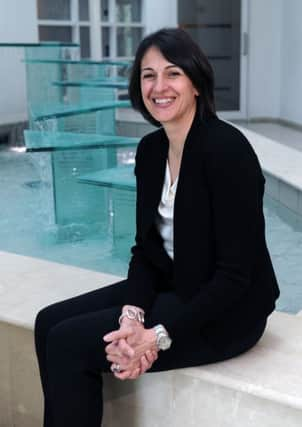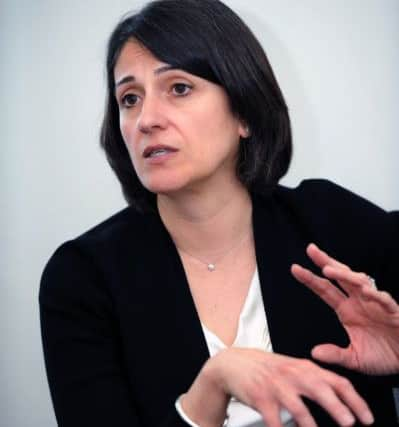Legal profession needs more women in senior positions, says AG head


This September marks a special anniversary for Monica Burch.
It will be 25 years since she qualified as a lawyer. “My silver jubilee,” says the senior partner at Addleshaw Goddard.
Advertisement
Hide AdAdvertisement
Hide AdWhen she started her career in the law in London, there were no computers on desks, fax and telex machines everywhere and, she recalls, a room full of terrifying secretaries.


“I could not have predicted where we are now,” says Burch, 49.
Looking to the future, she believes there will be more automation, more flexibility and, she hopes, more women in senior positions.
“It’s always been a profession that’s attracted men and women in equal numbers but it’s quite attritional given the client demands at the other end. I think technology is a great enabler of starting to equalise that.”
Advertisement
Hide AdAdvertisement
Hide AdBurch paints a picture of Addleshaw Goddard as a progressive firm. The 700-strong business has a very generous paternity leave policy and is very careful when women return from maternity leave, she says.
She dismisses any suggestion that client service, the be-all and end-all of her profession, might suffer as a result.
“I have worked flexibly for however many years and I have never had a client complain,” says Burch.
“I work a 90 per cent year. I take time off at school holidays. I have got three children. My clients don’t need to know where I am… they don’t mind so long as they are being dealt with and have a good service.”
Advertisement
Hide AdAdvertisement
Hide AdShe is a member of the Mentoring Foundation, an initiative that provides pro bono support to female executives at FTSE 100 companies, and is concerned that not enough women seem to be coming through to boardrooms from executive roles.
Burch believes that women need more encouragement to go for it.
Addleshaw Goddard set a target in 2010 to have 25 per cent female partners by 2014. It hit the target this year, a year late. The Leeds office is more progressive though, with nearly an even split of male and female partners, says Burch.
She was elevated to senior partner status in 2010 and also chairs the board. She is passionate about the need to provide greater diversity in Britain’s boardrooms, pointing to recent evidence to argue her case.
Advertisement
Hide AdAdvertisement
Hide Ad“We know from the financial crisis last time around that where you get a group of people thinking the same thing in the same way from the same background it doesn’t necessarily benefit British business.
“It just seems really simple to me. You have to get a group of people from across the piece. It is not just gender, it is ethnicity, different backgrounds and different outlooks, because if you all think the same way you all potentially go down the same hole and look where that got us last time,” she adds.
The daughter of a civil servant, Burch was born in York and went to primary school in the city, but most of her schooling was in Germany, where she attended at a comprehensive school run by the MoD.
She read jurisprudence at Pembroke College at Oxford University and started her career at one of Addleshaw Goddard’s legacy firms in London in 1988.
Advertisement
Hide AdAdvertisement
Hide AdApart from two years in New York, she has stayed with the firm throughout her career. Today, she commands a global business with offices in London, Leeds and Manchester in the UK, Dubai, Oman and Qatar in the Middle East and Singapore and Hong Kong in Asia. Revenues last year rose 12 per cent to £192m,
Burch says the northern market has been really strong, both sides of the Pennines.
She adds: “There’s a certain amount of sustained recovery. I would say this but we are the best firm in both cities and people want good advice.”
As a business leader with a big stake in the North, she believes the Northern Powerhouse concept as espoused by politicians has the potential to bring out investment that traditionally would have gone to London.
Advertisement
Hide AdAdvertisement
Hide AdBurch says: “If we can make transport links better, easier and swifter it’s removing the barriers to investment and making it attractive and easy.
“Having more control of fiscal matters is helpful because it goes back to the people on the ground knowing their market best and being able to think about what is going to attract investment and what is necessary.
“In a tiny way, that’s what we have done in really thinking about focusing on our local markets in our UK offices.
“You empower people who have the local knowledge and who have the connections and who understand the local economy. You don’t try and do that from a distance.”
Advertisement
Hide AdAdvertisement
Hide AdThe Leeds office is led by Tim Wheldon, a well-connected dealmaker; his counterpart in Manchester is Malcolm Pike, a partner in the city for 22 years.
Burch says that while the economy is definitely better, the legal market is no less fierce in its competition.
Firms are having to focus on how their businesses are run, where their labour force should be and what their margins are, she adds.
Burch says: “I think a successful lawyer in 2015 understands what their margin is, what level the work needs to be done at, understands their client’s business and really invests and thinks about the client’s drivers and what’s on the client’s horizon and who the client’s competitors are and therefore can advise accordingly both in terms of the legal advice given and also how to structure their own team.”
Gone are the days when law firms can grow by simply hiking their fees, she adds.